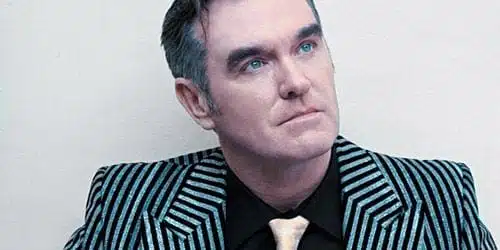
Morrissey’s quizzical look on the front cover of Swords seems both appropriate and contradictory to the music contained therein. Dressed like a blue-collar laborer on a break, he wears clothes that reflect his workman-like musical output over the better part of the last decade. But the unsure expression on his face seemingly questions the strength of that output, as if he still isn’t positive if releasing an album of b-sides is a good idea. Maybe, as his lyrics suggest, he’s still trying to make sense of this cruel world, or maybe his stomach hurts. We just don’t know. Regardless, it’s typical of the drama and enigmatic showmanship Morrissey has reveled in for years. The man wants to make you think almost as much as he wants to entertain you with his pain. His uneasy expression aside, the music on Swords is confident, assured and continues his later-career winning streak.
Swords is a collection of 18 b-sides culled from his last three studio albums: 2004’s You Are the Quarry, 2006’s Ringleader of the Tormentors and 2009’s Years of Refusal. Most critics and fans considered these good-to-great records, with You Are the Quarry as arguably the best. Quarry and Years, both produced by the late Jerry Finn, showed the most muscular, rocking side of Morrissey since 1992’s Your Arsenal. Ringleader, for the most part, was a more subtle, orchestral affair produced by Tony Visconti.
Swords unsurprisingly splits these two general styles across its tracks. The album feels like a collection of songs rather than a complete statement, but it never claimed to be something else. Regardless, the through line is strong enough to sustain this collection: the singular writing style and vocals of Morrissey combined with the playing of long-time guitarist Boz Boorer. Given that Morrissey is in the midst of a strong run of albums, it comes as no surprise that the b-sides would coalesce into something that nearly hangs together like a proper album. It doesn’t quite get there, but it’s close.
Selected by Morrissey himself, many of the tracks on the album have an immediate, forceful feel. “Ganglord” takes on the LAPD, and his venom is palpable: “They say ‘to protect and serve’ / But what they really need to say is / Get back to the ghetto.” Never one to mince words, the track reminds me of the vitriol of the Quarry track “Irish Blood, English Heart”, but with a more sinister overtone. Not too many musicians of his stature would offer such unvarnished, ugly truth via a pop song. It’s a positive attribute or an Achilles heel depending on the listener, but one that sets Morrissey apart in a sea of apolitical, empty-headed entertainers.
Not all the tracks on Swords are as successful as “Ganglord” or the rocker “It’s Hard to Walk Tall When You’re Small”. The softer “Sweetie-Pie” lingers just a little too long, but “Christian Dior” quickly remedies the dip in energy. The track is one of the most unabashedly beautiful on the album, and the orchestral backing serves the melody without overwhelming the vocal heroics of the ending. Like it’s namesake, “Christian Dior” exudes luxury. Elsewhere, a live cover of David Bowie’s “Drive-In Saturday” can’t quite charm as much as the original, but Morrissey’s sly lyrical substitutions keep it fun.
People will forever whine about Morrissey’s solo output not being as strong as his work with the Smiths. The simple fact remains that the man’s b-sides smoke 90% of what’s trendy today. The Smiths were great, but live in the now, we should rejoice in the knowledge that Morrissey continues to make solid music, and let the past go. Strangeways, Here We Come was 20 years ago. Uneasy expressions or not, Swords will slay if given the chance.
